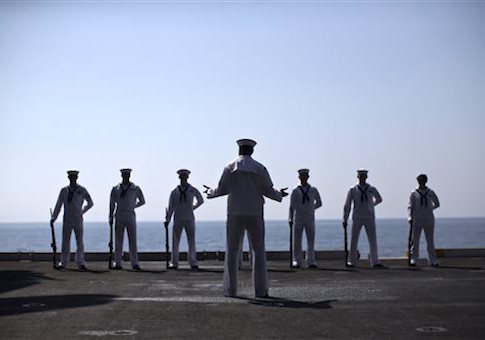The legal arm of the U.S. Navy recently warned personnel against using personal email accounts to conduct official business and to never transmit classified information using non-official accounts.
The Navy Judge Advocate General’s office, which provides legal services and support to the Navy, issued a notice to personnel last week highlighting Pentagon policy concerning the use of personal electronic accounts for official business, according to an email obtained by the Washington Free Beacon.
The warning comes in the wake of revelations that former Secretary of State Hillary Clinton and Defense Secretary Ash Carter used personal email for official business.
"DoD policy mandates that personal accounts shall NOT be used to conduct official DoD communication except under special circumstances," Capt. Errol Henriques, who works in the Judge Advocate General’s office, wrote in the email.
Exceptions are made when official messaging accounts are unavailable and personnel need to use non-official accounts to communicate to complete missions or when "technological difficulties" make it unreliable or impractical to use official modes of communication, according to the notice. Personnel can also use personal email when granted approval by the appropriate commanding officer or supervisor, or when heads of agency components say that non-official email is necessary to "execute certain interests of the federal government," such as recruiting.
"In all cases where an exception is present, users must exercise prudent judgment to ensure the safeguarding of potentially sensitive information," the notice explained. "The recognized exceptions NEVER warrant the transmission of classified information via non-official accounts."
The notice, which was sent Friday morning, summarized a recently-issued Department of Defense memorandum clarifying the military’s policy on the use of personal email for official business.
"I strongly encourage all recipients to read the entire memorandum to be familiar with its requirements," Henriques wrote in the message, which contained the memorandum as an attachment. "Commanding officers and civilian supervisors are requested to ensure that their subordinates are familiar with the policy and that its direction is followed in the execution of all official communications and transmissions of official information."
The notice was sent to personnel in the offices of the Judge Advocate General and the Commander of the Naval Legal Service Command. Vice Adm. James Crawford III, the judge advocate general, is the principal military legal counsel to the Navy secretary and the chief of naval operations. Rear Adm. John Hannink serves as the the Commander of the Naval Legal Services Command and leads attorneys providing legal services and support to Navy units around the world.
Henriques reminded Navy personnel that official business conducted over personal email, social media, or text messaging could be considered federal records and that they must ensure that the material is captured in their official accounts to abide by the Federal Records Act.
"The Federal Records Act defines records as ‘all recorded information, regardless of form or characteristics, made or received in connection with the transaction of public business that contains information that is appropriate for preservation as evidence of government organization, functions, policies, decisions, procedures, operations, or other activities, or that includes information of value to the agency,’" Henriques wrote.
"Personnel sending information via personal electronic accounts which constitutes an official record must copy their official electronic account immediately or forward the entire communication to their official account within 20 days of transmitting the record."
The notice comes as Hillary Clinton continues to receive scrutiny for her exclusive use of personal email to conduct official government business during her tenure at the State Department. While Clinton has insisted that she did nothing wrong by using private email, critics have argued that she violated the Federal Records Act.
Clinton turned over some 30,000 work-related emails to the State Department after it was revealed that she used personal email during her time in the Obama administration. Under court order, the agency reviewed and released Clinton’s official correspondence to the public. Twenty-two of the messages were withheld from release after the federal government determined that they contain "top secret" information, which is the highest level of classification.
More than 2,000 of Clinton’s emails on her personal account contain classified information, the State Department said, though none were marked classified when they originated on her server. The FBI is currently investigating Clinton’s email setup and is reportedly looking into possible criminal wrongdoing in the mishandling of classified information.
Clinton was not the only one to use personal email to conduct government business in the Obama administration. Defense Secretary Ash Carter also relied on a personal email account to do some official business during his first months leading the Pentagon, the New York Times reported in December. Carter has apologized for this.
"After reviewing his email practices earlier this year, the secretary believes that his previous, occasional use of personal email for work-related business, even for routine administrative issues and backed up to his official account, was a mistake," Pentagon press secretary Peter Cook said then. "As a result, he stopped such use of his personal email and further limited his use of email altogether."
Carter has maintained he never used personal email to transmit classified information. Cook said that all work-related messages sent or received from his personal account were copied or forwarded to his official email to ensure the documents’ preservation.
